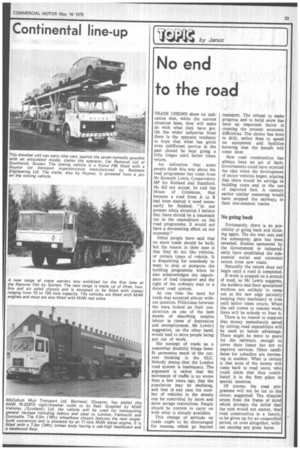No end to the road
Page 25

If you've noticed an error in this article please click here to report it so we can fix it.
TRADE UNIONS show no indication that, while the current situation lasts, they will make do with what they have got. On the wider industrial front there 'is the opposite tendency to hope that what has given even indifferent service in the past should be kept going a little longer until better times return.
An indication that some people think this way about the road programme has come from Mr Kenneth Lewis, Conservative MP for Rutland and Stamford. He did not accept, he told the House of Commons, that because a road from A to B had been started it need necessarily be finished. "In our present crisis situation I believe that there should be a traumatic cut in the expenditure on the road programme. It would not have a devastating effect on our economy."
Other people have said that no more roads should be built; but the reason in their case is that they do not like vehicles, or certain types of vehicle. It is disquieting for somebody to want to stop or postpone the building programme when he also acknowledges the importance of road transport arid the right of the ordinary man to a decent road system.
At one time the need for roads was accepted almost without question. Politicians between the wars looked on their construction as one of the best means of absorbing surplus labour in times of depression and unemployment. Mr Lewis's suggestion, on the other hand, would lead to more people being put out of work.
His concept of roads as a somewhat doubtful fringe benefit permeates much of the current thinking in the GLC. Nobody denies that the London road system is 'inadequate. The argument is rather that the movement of traffic is no worse than a few years ago, that the population may be declining, and that in any case the number of vehicles in the streets can be controlled by more and more savage restrictions. People should be content to carry on with what is already available.
This change of attitude on roads ought to be discouraged for reasons which go beyond transport. The refusal to make progress and to build anew has been an important factor in creating the present economic difficulties. The choice has been to drift, rather than to spend on equipment and facilities knowing that the benefit will come later.
New road construction has always been an act of faith. Governments could have rejected the idea when the development of motor vehicles began, arguing that there would be savings in building costs and in the use of imported fuel. A century earlier similar reasoning would have stopped the railways in their non-existent tracks.
No going back
Fortunately, there is no possibility of going back and thinking again. The die was cast and the subsequent gain has been revealed. Studies sponsored by the Government or independently have established the substantial social and economic return from new roads.
Naturally the return does not begin until a road is completed.
If work is stopped on a stretch of road, as Mr Lewis suggests, the builders and their specialised workers are unlikely to camp out at the raw edge patiently keeping their machinery in trim until better times return. When the call comes to resume work, there will be nobody to hear it.
There is no reason to suppose that money immediately saved by cutting road expenditure will be used to better advantage. There might be more to spare for the railways, enough to cover their losses but not to improve services. Other candidates for subsidies are increasing in number. What is certain is that none of the money will come back to road users, who could claim that they contributed it in the first place in special taxation.
Of course, the road programme will not be cut to the extent suggested. The disquiet arises from the frame of mind which prompts the belief that the cuts would not matter, that road construction is a luxury, to be given up for an unspecified period, or even altogether, without causing any great harm.




























































































